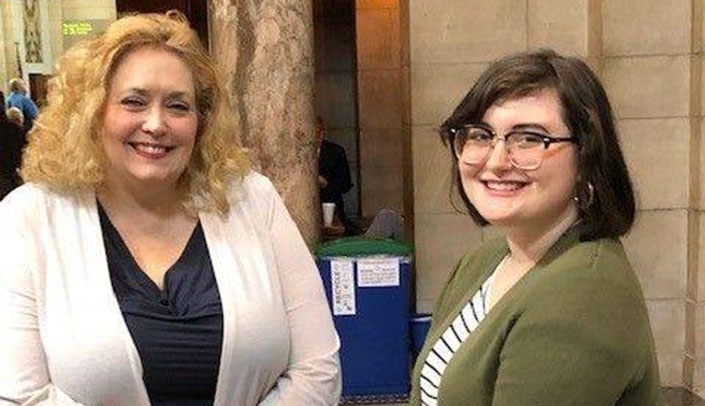Olivia Versaw has worn hearing aids almost her entire life. So when LB15 — “Adopt the Children of Nebraska Hearing Aid Act,” a bill that would guarantee insurance coverage for hearing aids for children — reached the floor of the Nebraska State Legislature, she wanted to make her voice heard.
As a longtime self-advocate and a trainee in Munroe-Meyer Institute’s Leadership Education in Neurodevelopmental Disorders (LEND) Program for individuals who wish to become leaders in the field of disability advocacy, she was prepared for the moment.
Become a LEND trainee
The Munroe-Meyer Institute’s Leadership Education in Neurodevelopmental Disorders (LEND) Program is seeking self-advocates and others who are interested in joining the program. For more information, contact Kellie Ellerbusch at MMI.
“While hearing aids are so incredible and beneficial, they are expensive,” Versaw said. “Before LB15, families would need to raise anywhere from $3,000 to $8,000 for this assistance. I was one of the kids whose parents could barely afford hearing aids. I was fortunate enough to win scholarships and grants for my hearing aids, but for many children, that isn’t their reality. This bill made hearing aids for children, no matter their economic status, more attainable.”
Versaw was one of four self-advocates recruited into the LEND program in 2018-19, said program coordinator Kellie Ellerbusch. The LEND program partnered with People First of Nebraska, a statewide self-advocacy organization, and Disability Rights Nebraska to mentor and support these trainees. Like other LEND trainees, the self-advocates are educators, not lobbyists. They can provide a personal perspective to lawmakers on how proposed bills, such as LB15, may affect people with disabilities.
Versaw and the other trainees worked throughout the legislative session and a little beyond, Ellerbusch said.
“As LEND trainees, they were not only learning how to advocate but also about disability issues and history,” she said.
Versaw said working with other disability advocates in the LEND Program was very enlightening.
“I am so aware of my own disability and story, but am not as invested in other tales, because these are not experiences I have had,” she said. “I also got to see the actual work that goes on inside legislation, to see how many people are actually involved in the process.”
Versaw particularly connected with Sen. Carol Blood, who represents District 3 in Sarpy County and who sponsored LB15, while she was working with the legislators.
“Sen. Blood is an amazing, incredible woman,” Versaw said. “She and her team were so encouraging and inviting when it came to including me.”
But Versaw downplayed her efforts to support the bill.
“I really don’t think I did that much,” she said. “I just shared my own story on social media, I blogged — I really just wanted to garner as much support as I could for this bill. People with disabilities are always forgotten, and our rights go under the carpet. By being vocal about something like this, I was able to direct some attention onto a subject that otherwise might have gone unnoticed.”
Ellerbusch had a different interpretation of Versaw’s impact.
“Olivia and the other self-advocates helped put faces to these issues and to educate policy makers about how proposed bills such as LB15 will affect people with disabilities. Work like this is the mission of the LEND program. Olivia’s efforts had a real effect.”
The proof? LB15 passed the legislature and was approved by Gov. Pete Ricketts this May.
